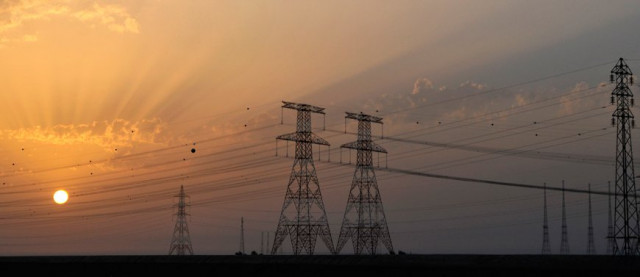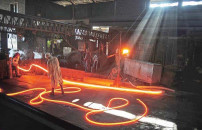Pakistan's power sector has $80b investment potential
Minister says scores of companies are interested in making investment

PHOTO: REUTERS
Speaking at a five-day inaugural training programme on Pakistan’s power regulatory regime organised by the National Electric Power Regulatory Authority (Nepra), the minister said foreign direct investment (FDI) was entering the country as scores of companies had expressed interest in investing in the sector.
“The government has planned to increase the power generation capacity to 42,000 megawatts by 2030,” he added. “The generation sector alone has an investment opportunity of $40 billion besides $20 billion in the transmission area.”
He added that Saudi Arabia was making a huge investment in Pakistan’s energy sector including the establishment of a 500MW solar power plant in Balochistan, constructing a petrochemical complex and an oil refinery.
Welcoming the delegates, the minister said bilateral cooperation would not only bring peace but would also ensure prosperity in the region. He said there was a dire need to strengthen the South Asian Association for Regional Cooperation (Saarc) platform. He stressed the need for being proactive, especially when technological changes were taking place at a rapid pace.
He informed programme participants that draft of the new renewable energy policy was being prepared after which maximum benefit could be taken from renewable sources.
“As per the plan, the share of renewable energy will be enhanced to 20% in the total energy mix by 2025 and 30% by 2030,” he said. “Other domestic resources including hydel, coal and nuclear are also being exploited to change the current energy mix from 60% imported fuel and 40% local resources.”
He said the cost of renewable energy was decreasing which would ultimately benefit consumers. “Socio-economic conditions of people will also improve when improvements are made in the power production sector,” he added.
He told the participants that special focus was being placed on net-metering and wheeling in the new policy.
“China-Pakistan Economic Corridor (CPEC) is not only important for the development of Pakistan but also for development in the region,” he added. Special Economic Zones (SEZs) were being set up under CPEC, which would reduce the cost of doing business, he added.
He claimed that 26,000MW of electricity would be transmitted in the next summer and appreciated Nepra for arranging the training session and for its role in facilitating the power sector.
Speaking on the occasion, Nepra Chairman Tauseef H Farooqi expressed hope that the programme participants would gain valuable knowledge on how to carry out their responsibilities as a regulator. He also shared his future vision for Nepra. He urged professionals to focus on integrity, accountability, justice, and honesty while carrying out their responsibilities.
Also present on the occasion, Saarc Energy Centre Executive Director Muhammad Naeem Malik highlighted the role of the Saarc Energy Centre, saying that the centre would continue to facilitate the exchange of knowledge with Saarc member countries.
The purpose of the programme was to exchange knowledge and share the experience and lessons learned by Pakistan’s regulatory professionals with Afghan delegates.
Published in The Express Tribune, September 17th, 2019.
Like Business on Facebook, follow @TribuneBiz on Twitter to stay informed and join in the conversation.



















COMMENTS
Comments are moderated and generally will be posted if they are on-topic and not abusive.
For more information, please see our Comments FAQ